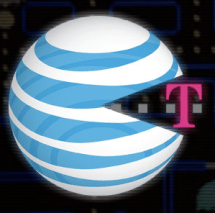 Like the kid who beat you up at the bus stop because he felt bad about being obese, AT&T is a bully because it hates itself. At least that’s how the mobile giant appears in its enormous and unintentionally hilarious FCC filing, its first attempt at trying to convince regulators that acquiring T-Mobile will “promote, not diminish” competition among mobile carriers.
Like the kid who beat you up at the bus stop because he felt bad about being obese, AT&T is a bully because it hates itself. At least that’s how the mobile giant appears in its enormous and unintentionally hilarious FCC filing, its first attempt at trying to convince regulators that acquiring T-Mobile will “promote, not diminish” competition among mobile carriers.
As first reported by Ars Technica, here are a few examples of how AT&T describes itself in an attempt to make it appear like the underdog who’s just trying to make it in the big ol’ mobile world:
- “AT&T’s network-capacity challenges, however, are not just ‘looming’ a few years down the road—they are here today, the product of AT&T’s mobile broadband leadership and its need to support multiple generations of services.”
- “In many markets where T-Mobile USA has spectrum, AT&T’s capacity constraints also prevent it from dedicating enough spectrum to launch LTE, deploy it optimally, or meet expected demand.”
- “From a consumer’s perspective, the capacity constraints confronting these companies, if unaddressed, would translate into more dropped and blocked calls, slower speeds, and access to fewer and less advanced applications.”
And their friend T-Mobile? Surely it is better off?
- “T-Mobile is not an important factor in AT&T’s competitive decision-making.”
- “As a standalone company, however, T-Mobile USA would continue to face substantial commercial and spectrum-related challenges. It confronts increased competition from industry mavericks such as MetroPCS, Leap, and others; its percentage of US subscribers has been falling for nearly two years; and it has no clear path to LTE.”
- “T-Mobile USA, in contrast to others, does not have a differentiated network position. T-Mobile USA has admitted that it suffered from its late transition to a 3G network, and unlike Sprint, which first promoted a 4G network, T-Mobile USA’s HSPA+ launch appears to have been lost among other carriers’ 4G messaging.”
- “AT&T does not believe that T-Mobile USA has a particularly compelling portfolio of smartphone offerings as compared to AT&T, Verizon, and Sprint.”
- “To the extent that T-Mobile USA’s prices are lower than those received by AT&T and Verizon Wireless for otherwise comparable subscribers, T-Mobile USA’s lower prices have not stimulated growth in its share of retail subscribers. This indicates that other aspects of T-Mobile USA’s service are in some way lacking.”
Ouch. Maybe $39 billion will smooth over things between the two of them.
VentureBeat's mission is to be a digital town square for technical decision-makers to gain knowledge about transformative enterprise technology and transact. Learn More